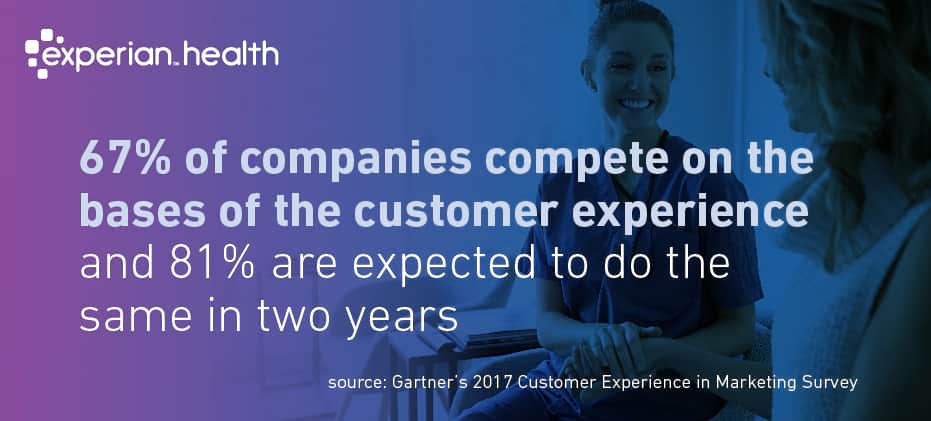At A Glance
When it comes to working smarter, attendees seemed to agree that one aspect of the healthcare experience comes out top for providers and patients alike: the cost of care.
New Content
They don’t make medical diagnoses. They would never prescribe clinical treatment. They may not ever be in the same room as your patients. Still, your healthcare organization’s marketing team are on the frontline when it comes to improving patient outcomes.
The rise of healthcare consumerism means patients have come to expect the same frictionless experience they often receive in retail and financial services. For healthcare providers who want to deliver an outstanding patient experience, this means using data and insights about patients’ lifestyles, behaviors and preferences to personalize the content, timing and frequency of your communications.
By connecting patients to the right information at the right time, consumer-driven marketing strategies lift engagement and help patients access care, in turn driving improvements in patient outcomes.
The benefits of a consumer-focused marketing strategy
According to Gartner’s 2017 Customer Experience in Marketing Survey, 67% of companies said they compete on the basis of customer experience. This goes to show the growing importance of understanding customer interactions and how those can result in greater customer satisfaction, loyalty and advocacy.
Healthcare providers can learn from brands in other fields that are already using data-driven marketing to create a better consumer experience and drive business growth. For example:
- Amazon makes it easy for customers to purchase additional items, with the use of ‘one-click’ buy buttons and helpful recommendations based on previous buying behavior
- Walmart Online reminds you when you’ve forgotten to add one of your usual household staples to your cart
- Twitter suggests news articles that may be of interest, based on what you’ve liked and shared before
- Google knows you’re more likely to respond to a nudge to sign up for Google Pay when you already have a Google account, because you’re already part of their digital ecosystem
These brands use consumer insights to tailor content at every opportunity. They segment audiences based on lifestyle and behavioral data, so specific consumers only see the most relevant messages. In the same way, a consumer-focused healthcare marketing strategy can help providers attract new customers, provide timely and relevant information to current members, and boost brand loyalty.
How to use consumer data to give patients the right content at the right time
Whether you want to reach a busy parent seeking the best pediatric care for their child, or an elderly patient looking for advice on how to stay active—data and analytics can help you identify the consumers your health system wants to attract AND give them the most useful content as they move through your system as consumers. It’ll tell you whether a text message as they leave work at 6 pm would be most likely to garner a quick response, or whether a weekend email guiding them to their patient portal would be a better way to help them make informed decisions about their care.
The essential ingredient here is reliable consumer data. Data that’s outdated, lacking key customer attributes or of questionable integrity is going to be unhelpful as a marketing tool. You must also maintain compliance with consumer privacy best practice.
But when you’re armed with the highest quality lifestyle, demographic, psychographic and behavioral data, you can start to understand what the patient is thinking, feeling and doing at each point in their patient journey. What does daily life look like for your consumers? How much can they afford? Would they be likely to compare prices and shop around for services, or would they prioritize ease of use or quality? Do they prefer to handle ‘life admin’ on a mobile device or by phone? What time of day will they be most receptive to information from a service provider?
When you know what information will be most helpful to your patients, you can create relevant content and segment your marketing campaign to deliver the right information, at the right time, in the right format.
Once you’ve done that, analytics can also allow you to monitor and track the response to this tailored content, to evaluate and refine the strategies that are working best.
Working with a data partner to leverage consumer insights
Leveraging consumer insights is somewhat uncharted territory for many healthcare providers, but you don’t have to go it alone. Partnering with a reliable third-party vendor can help you navigate the world of data security and compliance and become nimbler in your communications with patients.
Karly Rowe, Vice President of New Product Development, Identity and Care Management Products at Experian Health explains:
“Understanding how the right data can transform your patient experience will continue to grow in importance for healthcare providers who want to make a successful play for market share. As the sheer volume of healthcare data grows at an astronomical rate, it’s essential to know how to draw out the most useful insights. You need to know where to source the highest quality data and how to deploy it effectively within your organization to drive proactive engagement with patients.”
For organizations looking to improve patient retention and engagement, Experian Health offers access to datasets encompassing the most comprehensive resources for building strong relationships with your customers. By showing your patients you understand their health aspirations and offering the personalized experience they’re seeking, they’re more likely to continue logging in to their portals, showing up for appointments, and engaging with the services they really need to improve their health.



